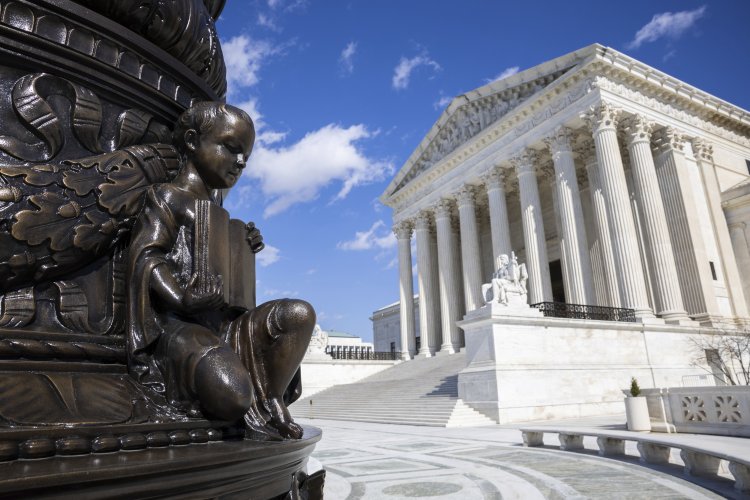Supreme Court Allows Trump Administration to Cancel $65M in Teaching Grants, Marking a Victory for Trump
Chief Justice John Roberts, along with the court's three liberal justices, expressed their dissent regarding the high court’s ruling.

Chief Justice John Roberts and the court’s three liberal justices dissented from this ruling. The decision aligns with the Trump administration’s broader initiative to cancel grants, terminate contracts, and dismiss employees at federal agencies, although several of these efforts have faced legal challenges from Democratic-led states, nonprofit organizations, and federal employee unions.
The Supreme Court's ruling represents a significant victory for the Trump administration, reinforcing its cost-cutting agenda and efforts to limit DEI practices across federal agencies. In an unsigned order, supported by all the court's conservative justices except Roberts, the majority indicated that the case did not merit the extraordinary relief of a restraining order against the federal government. They noted that the states involved in the case have the resources to maintain the teacher-training programs while they contest the issue in court.
The majority emphasized that “the states have represented in this litigation that they have the financial wherewithal to keep their programs running. So, if respondents ultimately prevail, they can recover any wrongfully withheld funds through suit in an appropriate forum.” Further, they expressed that any potential harm resulting from the funding halt would be self-inflicted if the states opted not to independently fund the programs. Additionally, the majority suggested that the lawsuit might have been filed in the wrong venue since disputes over federal contracts typically fall under the jurisdiction of the Court of Federal Claims in Washington.
In contrast, Justice Elena Kagan, dissenting, argued that the majority wrongly intervened on an emergency basis instead of allowing the litigation to unfold traditionally. She stated, “In my view, nothing about this case demanded our immediate intervention. Rather than make new law on our emergency docket, we should have allowed the dispute to proceed in the ordinary way.”
Justice Ketanji Brown Jackson, joined by Justice Sonia Sotomayor, also questioned the urgency of the matter, stating, “It is beyond puzzling that a majority of Justices conceive of the Government’s application as an emergency.” Jackson expressed concern about the “devastation” resulting from the sudden termination of funding and noted that the administration's actions seemed inconsistent with Congress' intent when establishing the programs. “It would be manifestly arbitrary and capricious for the Department to terminate grants for funding diversity-related programs that the law expressly requires,” she asserted. “The agency’s abruptness leaves one wondering whether any reasoned decision-making has occurred with respect to these terminations at all.”
Roberts did not participate in either dissent and did not provide a rationale for his vote against the administration's request.
The grants in question were established by Congress to recruit and train teachers for “underserved” communities and to seek educators from “underrepresented populations” who "reflect the communities in which they will teach." The Teacher Quality Partnership program was initiated in 2008 under President George W. Bush, while the Supporting Effective Educator Development program was authorized in 2015 during President Barack Obama’s tenure.
The Justice Department defended the Trump administration’s actions, arguing that the case should serve as a signal to limit what it termed “fiscal micromanagement” by federal district court judges. Acting Solicitor General Sarah Harris urged the justices to end what she labeled the “unconstitutional reign” of federal district courts as managers of Executive Branch funding and grant decisions.
The states involved in the lawsuit argued that the organizations receiving the grants, particularly state colleges and universities, were utilizing the funds consistent with Congress' goals. They contended that the terminations caused chaos for the institutions and the teachers being trained. Furthermore, they maintained that the Education Department must undergo notice-and-comment rulemaking in order to change the objectives of the grant programs.
U.S. District Judge Myong Joun, appointed by Biden and based in Boston, ruled in March that the Education Department had failed to provide a “reasoned explanation” for the grant cancellations, deeming them “arbitrary and capricious.” Another federal judge in Maryland had also ordered the Trump administration to continue funding similar grants for specific education-related groups involved in a separate lawsuit challenging the termination efforts.
The Supreme Court's ruling on these teacher grants is its second concerning a spending-related matter brought to the court by the Trump administration on an emergency basis since Trump began his second term in January. Last month, the justices, in a 5-4 decision, rejected lifting a lower court order that required the federal government to pay approximately $2 billion in previously incurred bills for foreign aid grants and contracts that the Trump administration sought to cancel, although the overall implications of that order remain unclear as the deadline for payment had already passed.
Thomas Evans for TROIB News












